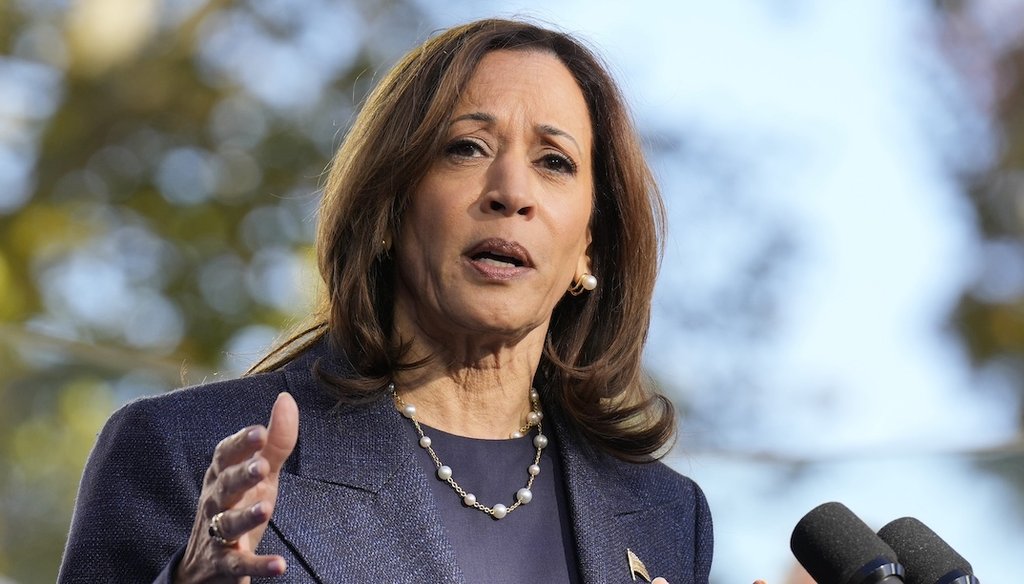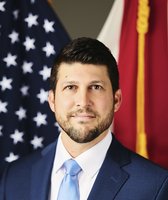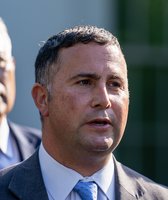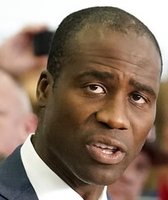Get PolitiFact in your inbox.

Vice President Kamala Harris, the Democratic presidential nominee, speaks Oct. 16, 2024 during a campaign event in Washington Crossing, Pa. (AP)
In a frequently contentious, sometimes testy exchange, Vice President Kamala Harris went on Fox News and fielded Chief Political Anchor Bret Baier’s questions on immigration, the economy and her policy differences with her Republican challenger, former President Donald Trump, and her boss, President Joe Biden.
Harris, the Democratic presidential nominee, did her first-ever Fox News interview on Oct. 16 as part of her home-stretch election interview blitz.
Baier sometimes spoke over Harris in back and forths about topics Trump has called her weaknesses, particularly border policy. Baier asked Harris how many migrants had been released into the country under the Biden-Harris administration, how she’d reduce the count and why some of her stances had shifted since her 2019 presidential campaign. He asked Harris whether immigrants illegally in the U.S. should qualify for driver's licenses, free tuition or health care, saying that her running mate, Minnesota Gov. Tim Walz, had approved laws that did this.
Harris, meanwhile, called Trump unfit to serve, and said many of his former advisers had said the same. She also said his plans would weaken the economy, but hers would strengthen it.
Harris also pointedly said her path would differ from Biden’s.
"My presidency will not be a continuation of Joe Biden's presidency," she said. "And like every new president that comes into office, I will bring my life experiences, my professional experiences, and fresh and new ideas."
We fact-checked several of Harris’ claims (and some of what Baier said).
Immigration
Harris said border security bill would have hired 1,500 border agents
Harris said the border security bill, introduced in February by a bipartisan group of senators, "would have put 1,500 more border agents at the border."
The bill, which failed twice to pass the Senate, would have given the Department of Homeland Security billions of dollars for immigration and border security measures. Specifically, the bill would have given U.S. Customs and Border Protection $584 million to hire more personnel and $139 million for U.S. Border Patrol overtime pay. It also would have allowed the department to hire people faster.
A White House fact sheet said the bill would have added "more than 1,500 new Customs and Border Protection personnel."
Harris said she does not support decriminalizing illegal border crossings
Shifting from comments she made years ago, Harris said she does not support decriminalizing illegal border crossings.
"I do not believe in decriminalizing border crossings, and I have not done that as vice president. I will not do that as president," Harris said.
In 2017, Harris said "an undocumented immigrant is not a criminal," while discussing Trump’s immigration actions, including an executive order banning citizens from seven Muslim-majority countries from entering the United States for 90 days.
Being in the U.S. without documentation is a civil, not criminal offense; crossing the U.S. border illegally is a criminal violation.
In 2019 when she was running for president, Harris raised her hand at a Democratic presidential debate when a moderator asked candidates who thought crossing the border without documentation should be a civil, not criminal offense. The conversation about decriminalizing illegal immigration at the time revolved around Trump’s "zero-tolerance" immigration policy which led to the separation of children and parents arriving together at U.S. borders.
Harris is correct that Border Patrol union endorsed bipartisan border security bill
In February, a bipartisan group of senators introduced a border security bill that would have given immigration officials more funding and changed how asylum is decided for people arriving at the United States’ southwest border.
Sens. Chris Murphy, D-Conn., James Lankford, R-Okla. and Sen. Kyrsten Sinema, I-Ariz. co-sponsored the bill.
The National Border Patrol Council — the U.S. Border Patrol’s union — endorsed the bill. The Border Patrol union endorsed Trump’s presidential campaign Oct. 13.
Baier said the border bill would have let in 1.8 million immigrants a year. Was he right?
The failed Senate bipartisan border security bill would have given the executive branch emergency authority to bar most migrants from seeking asylum if unauthorized immigration at the border reached an average of 5,000 encounters a day during seven consecutive days. Encounters data tracks how many times officials stop migrants, not how many are let in.
Over a year, the bill "would have allowed 1.8 million illegal immigrants into the country," Baier said.
But that’s inaccurate, immigration experts have said.
The number of encounters triggers the emergency authority, and the authority changes what happens when people try crossing the border. But the bill does not say that a specific number of people are allowed to illegally cross the border.
Before the emergency authority is triggered, immigration law would continue to be enforced with a higher standard for asylum interviews, a faster adjudication process and increased detention space.
Walz signed laws to make immigrants eligible for driver’s licenses, tuition scholarships, health care
Questioning Harris over her previous positions, Baier said that in 2019 she supported "allowing immigrants in the country illegally to apply for driver's licenses, to qualify for free tuition at universities, to be enrolled in free health care." He added that her presidential running mate, Walz, "signed those very things into state law."
True. Walz signed a bill in 2023 that lets people in Minnesota, regardless of immigration status, apply for a license or ID card. To get a license, people must meet certain requirements. Walz said the bill would make roads safer because it ensured drivers in the state are licensed and carry insurance.
Walz signed another bill that created a scholarship program to cover tuition costs at Minnesota public colleges and universities for students whose household income is less than $80,000 a year. Students who are illegally in the U.S. can apply if they have attended a Minnesota school for at least three years and graduated or received a GED certificate in Minnesota.
Walz also signed legislation that lets immigrants who are in the country illegally enroll in MinnesotaCare, the state’s publicly subsidized health insurance program for low-income residents. People enrolled in MinnesotaCare pay premiums, set based on household size and income. There are also cost-sharing requirements, such as copayments and deductibles.
Economy
Nobel laureates described Harris’ economic agenda as ‘superior’ to Trump’s
Harris said 16 Nobel laureates indicated that her economic plan "would strengthen our economy, (Trump’s) would make them weaker, would ignite inflation and invite a recession by the middle of next year." This is Mostly True.
Harris correctly describes what the Nobel laureates said about inflation during a Trump presidency: "There is rightly a worry that Donald Trump will reignite this inflation." But while the group describes Harris’ agenda as "vastly superior" to Trump’s, their letter doesn’t specifically predict a recession by the middle of 2025.
Rather, the group wrote: "We believe that a second Trump term would have a negative impact on the U.S.’s economic standing in the world and a destabilizing effect on the U.S.’s domestic economy."
The 16 economists are George Akerlof, Angus Deaton, Claudia Goldin, Oliver Hart, Eric S. Maskin, Daniel L. McFadden, Paul R. Milgrom, Roger B. Myerson, Edmund S. Phelps, Paul M. Romer, Alvin E. Roth, William F. Sharp, Robert J. Shiller, Christopher A. Sims, Joseph Stiglitz, and Robert B. Wilson.
Foreign policy
Trump pulled the U.S. out of the Iran nuclear deal in 2018
When Baier pressed Harris about failing to rein in Iran, Harris said it was "Donald Trump who pulled out of a deal that would have actually put Iran in check."
In May 2018, Trump said the U.S. would exit a nuclear pact with Iran and reimpose sanctions on Tehran, saying the Obama-era deal failed to contain the regime’s nuclear ambitions and thwart its regional meddling.
The withdrawal advanced Trump’s campaign promise to shake up the 2015 deal, which six additional world powers had originally joined. Under the deal, Iran scaled back its nuclear program in exchange for relief from crippling sanctions. Foreign policy experts said the deal rolled back Iran’s nuclear capabilities and ensured that, in the worst-case scenario, the country would be proliferating from a lower baseline.
But Trump had denounced the deal as a narrow and shortsighted windfall for Tehran, and chafed at its failure to address Iran’s missile program or Middle East military activity.
LGBTQ+ issues
What we know about Harris' support for gender-affirming care for prisoners
Baier asked Harris if she supports "using taxpayer dollars to help prison inmates or detained illegal aliens to transition to another gender?"
Harris said, "I will follow the law. And it’s a law that Donald Trump actually followed."
Harris was referring to an Oct. 16 New York Times story detailing that under Trump, the Justice Department’s Bureau of Prisons, "provided an array of gender-affirming treatments, including hormone therapy, for a small group of inmates."
The story was notable because the Trump campaign has focused on Harris’ support of these procedures for transgender inmates. She wrote in a 2019 American Civil Liberties Union questionnaire, "I support policies ensuring that federal prisoners and detainees are able to obtain medically necessary care for gender transition, including surgical care, while incarcerated or detained."
The New York Times reported that the Bureau of Prisons officials in 2018 wrote that it was obligated under federal law to pay for prisoner’s surgeries if they were considered medically necessary. In 2019, federal inmate Cristina Nichole Iglesias sued the bureau after she said it denied her gender-affirming care.
In 2022, Iglesias settled the case, becoming the second person in federal custody to receive gender-affirming surgery.
PolitiFact Copy Chief Matthew Crowley and Chief Correspondent Louis Jacobson contributed to this report.
We updated this story on Oct. 17 and removed the previous liveblog.
Our Sources
Links included in the story.









































